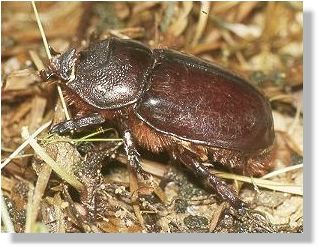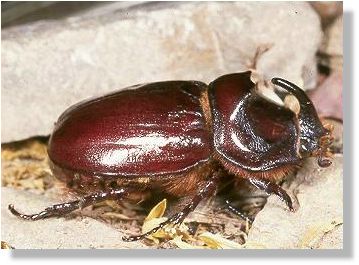| The ?? Chafer
(Oryctes nasicornis) belong to the big European beetles and may reach a
size of up to 40 mm. The species occurs all over Europe, North Africa and
a large part of Central Asia. It is protected in some European
countries.
?? chafers live in the lowlands, that is, prairie forests and open, deciduous forests. In central Europe most often they prefer warm oak forests. Because they are active during dusk and after sunset only, they are hardly encountered at all. The female lays yellowish eggs up to 5 mm long into rotten tree trunks or roots, or sometimes into compost or sawdust heaps. |

Small horn: female |
